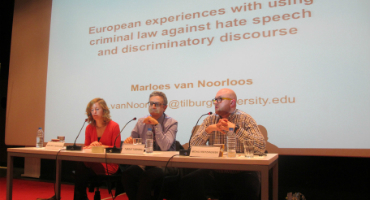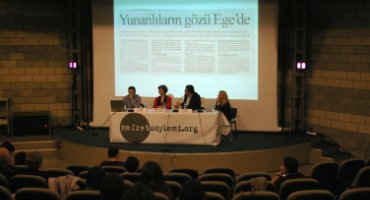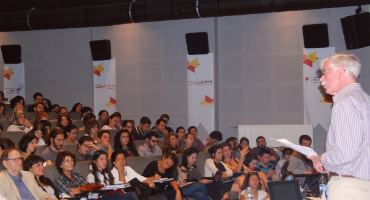The conference organized by the Media Watch on Hate Speech project of Hrant Dink Foundation was held on 21-22 March 2012 at Istanbul Bilgi University and Kadir Has University. In the first day of the conference, Dr. Sejal Parmar, senior legal officer at "Article 19" and Assoc. Prof. Dr. Esra Arsan, lecturer at the Faculty of Communication in Istanbul Bilgi University, gave two talks. In the second day of the conference, Mahmut Çınar from the Faculty of Communication in Bahçeşehir University gave a talk together with Sejal Parmar.
Esra Arsan focused on the production and normalization of discriminatory discourse by the media targeting different groups in different periods. As Arsan pointed out, Turkish Republic is established on certain fears and taboos, and the Turkish media, by using those fears, acts as the carrier of the national ideology. She talked about case examples of Islamophobia, Kurd-phobia, non-Muslim phobia and lastly, Ataturk phobia that started to emerge in recent years. Arsan stressed that the media, rather than protecting the rights of the disadvantaged, is protecting the state’s ideology similar to the judiciary system. She also mentioned the phenomenon named vigilantism and gave examples regarding how the state gives the permission to use its weapons to its citizens.
Sejal Parmar, talked about the hate speech concept, limits to freedom of expression together with the goals and the scope of the prohibitons on incitement in international law. Parmar stressed that the concept of hate speech is too broad and lacks clarity and that it is important for protecting freedom of expression to identify which types of speech require legal restrictions. She then explained the term incitement which she defined as hate speech that should be legally restricted. She emphasized that a clear definition of incitement can be found in Camden Principles on Freedom of Expression and Equality prepared by Article 19 as a result of expert debate seminars organized by the OHCHR. Finally, she asserted that Turkey should implement Article 20 of International Convenant on Civil and Political Rights in its domestic law.
In the second day of the conference, Parmar delivered a speech on the role of the media and civil society organizations together with the state actors, in the promotion of intercultural understanding. She emphasized that as opposed to legal restrictions, the role of the aforementioned actors is more crucial in the struggle against hate speech. After highlighting the vagueness of the boundary between freedom of expression and hate speech, Çınar focused on how the term “hate speech” can be defined. He argued for the importance of exposing hate speech and understanding the historical roots of the national consciousness underpinning such speech through a change in academic curricula.
Dr. Sejal Parmar is Senior Legal Officer at ARTICLE 19, the Global Campaign for Free Expression, and Visiting Lecturer at Queen Mary, University of London where she is Course Convener for the LLM course in International Human Rights Law. On behalf of ARTICLE 19, she has written numerous position statements, submissions, legal analyses and amicus briefs and delivered oral presentations and trainings to a broad range of intergovernmental, governmental and non-governmental audiences around the world. She leads the organisation’s legal and policy work at the UN human rights bodies, notably the Human Rights Council and the Human Rights Committee, and has also presented at meetings of EU, the Council of Europe and the OSCE. Her work focuses on the relationship between freedom of expression and the right to information, on the one hand, and other human rights and interests, on the other. She leads ARTICLE 19’s work on issues concerning freedom of expression, freedom of religion and equality, including laws on “defamation of religions” and blasphemy and the scope of Article 20 of the International Covenant on Civil and Political Rights. She has written policy papers on a diversity of subjects, including climate change and the right to information to bans, bans on the full-face veil and freedom of expression, new media and pluralism and is currently developing a paper on the right to health and the right to information. Currently a member of the Advisory Council of Advocates for International Development (A4ID), Parmar has provided legal advice on human rights issues to numerous NGOs including CIVICUS, Action Aid, Plan International, the Robert F Kennedy Center for Human Rights and the International Lesbian and Gay Association.
Asst. Prof. Esra Arsan used to work as a print journalist for more than 10 years for several national newspapers in Istanbul, Turkey, now she teaches journalism at Istanbul Bilgi University. She is also a well-known media critic in Turkey. Her articles in which she analyses journalism practices in Turkey have been published in many newspapers, magazines, web sites and books. Arsan holds her Ph.D degree in journalism studies specialising in political journalism. She is a former Reuters Foundation Journalism Fellow of Oxford University, UK. Arsan has three books published: Elections in the Newspapers, European Union and Journalism, and Media Watch.
Mahmut Çınar is an instructor at Bahçeşehir University, Istanbul. His academic research focuses on media and nationalism, emergence of modern Turkey and Turkish national identity, and minority media. He has attended national/international conferences on journalism, media, and cultural studies; participated in and facilitated several workshops on discrimination, diversity, and hate speech. He has also been involved in Council of Europe’s ‘Speak out against discrimination campaign’ since August 2009 and contributed to campaign’s educational pack for journalism students and professional journalists.




